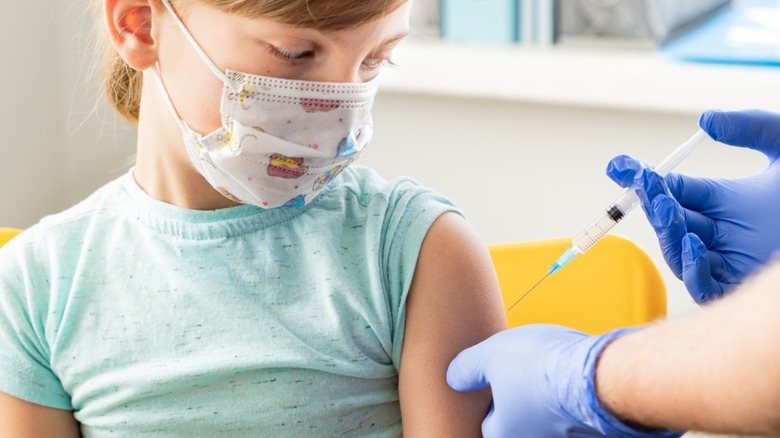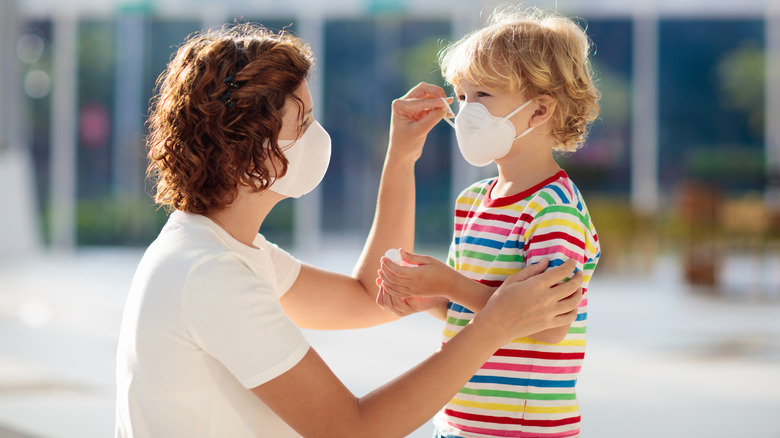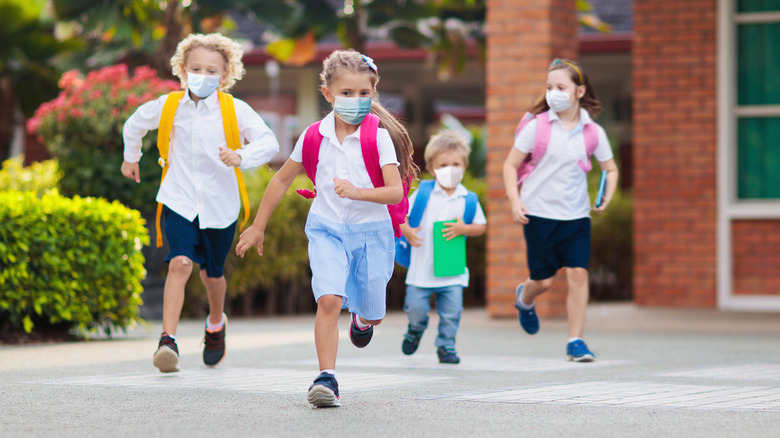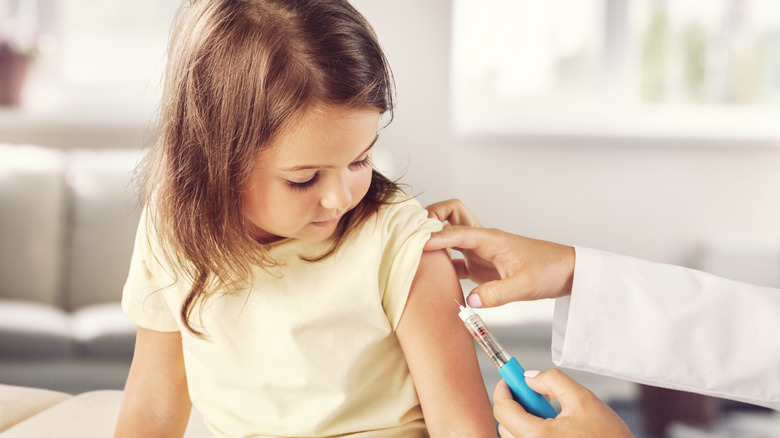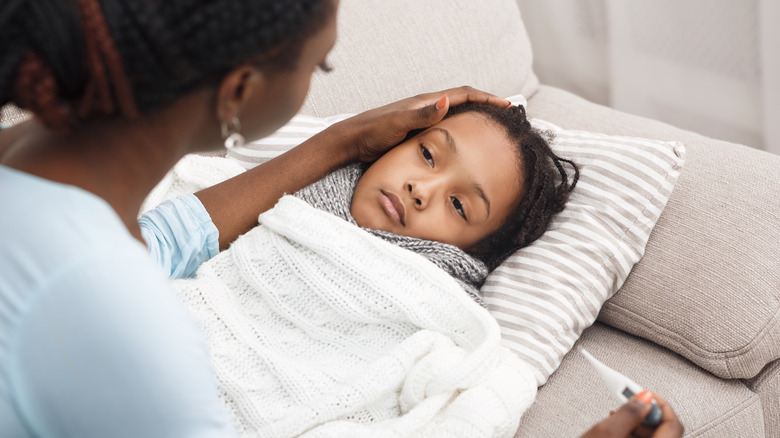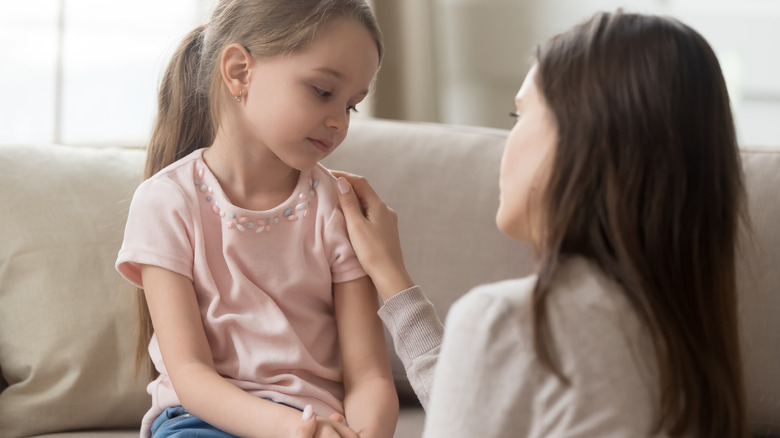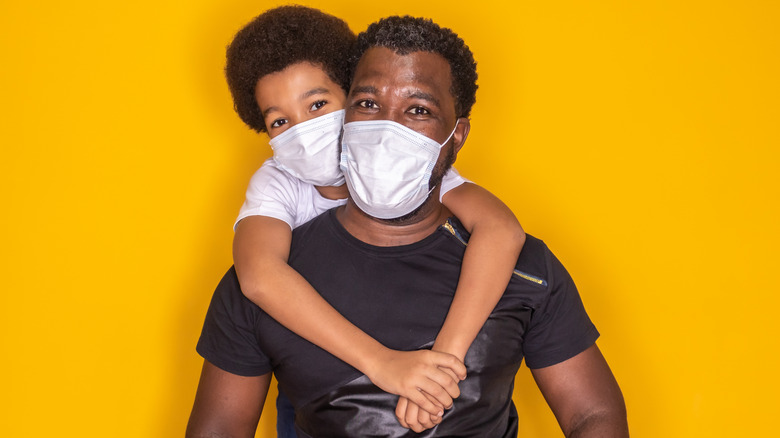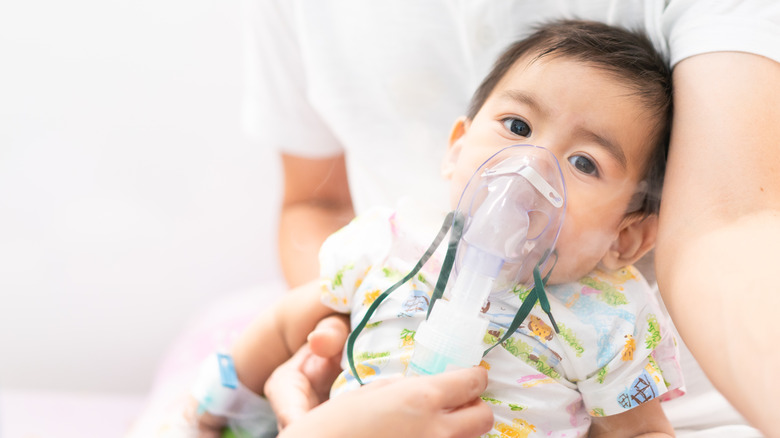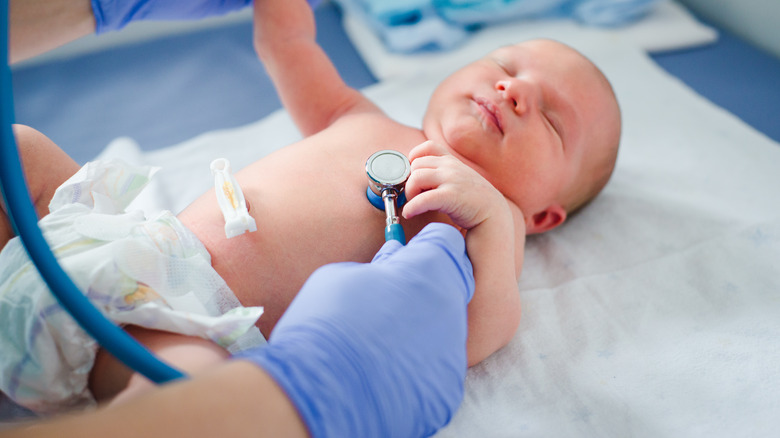Children And The COVID-19 Vaccine: Everything You Should Know
COVID-19 vaccines have undoubtedly been saving hundreds of thousands of lives (via Quartz). This, in turn, has been facilitating the "re-opening" of the world, which, in turn, is helping to mitigate the devastating damage the pandemic has wrought on the global economy, according to the United States Census Bureau. Although healthy children are not, statistically speaking, at high risk for severe COVID-19 illness, the vaccination of children against COVID-19 is seen as critical, nevertheless, to the optimal containment of the pandemic's spread (via McGill University).
Early on in the American COVID-19 vaccine program, the three FDA-authorized vaccines were rolled out clinically to adults only. However, that has since changed (via CDC). Experts say that opening the COVID-19 vaccination program to children of all ages has been and will continue to be a "game-changer," particularly in light of the emerging new variants such as delta and omicron (via Texas Public Radio). As Dr. Erin Carlson, director of graduate public health programs at the University of Texas at Arlington, pointed out, children, and particularly adolescents, may well be playing a significant role in the spread of the new variants.
Kids ages 5 and up are eligible for a COVID-19 vaccine
As of October 29, 2021, children ages five and up are now eligible to receive the two-dose Pfizer COVID-19 vaccine. Prior to that, this vaccine had been authorized for emergency use in children ages 12 through 15, with the dosage being the same as that approved for children ages 16 and up (via Mayo Clinic). For children between the ages of 5 and 11, the dosage is lower than that used for older children.
In children ages 5 through 11, the Pfizer vaccine was proven 90.7% effective in preventing COVID-19, with no serious side effects, in clinical trials, according to an FDA news release. In children ages 12 through 15, it was proven 100% effective. In children ages 16 and older, it was proven close to 91% effective at preventing severe COVID-19 illness, and early research indicates it is 96% effective at preventing severe COVID-19 illness due to the delta variant (via Mayo Clinic).
The CDC highlights the importance of vaccinating children against COVID-19, noting that children can become "very sick" with COVID-19 and can experience both long and/or short-term complications. Specifically, the CDC states, "COVID-19 ranks as one of the top 10 causes of death for children ages 5 through 11 years." Further, the CDC points out that children can spread COVID-19 to other children, their parents, caregivers, teachers, and all other adults with whom they come into contact.
Children under the age of 5
At present, the only COVID-19 vaccine that has received FDA emergency use authorization (EUA) for use in children and teens is the Pfizer vaccine, and its authorization is limited to children ages 5 and up (via CDC). However, Dr. Anthony Fauci, director of the National Institute of Allergy and Infectious Diseases, said in mid-November, "Hopefully within a reasonably short period of time, likely the beginning of next year in 2022 ... it will be available to [babies and toddlers]," subject, of course to the results of clinical trials (via Business Insider).
In March 2021, Pfizer began testing its vaccine in children ages 6 months through 11 years old. EUA was granted on October 29 for children ages 5 and up within that population. As of this writing, Moderna is in at least Phase 2/3 of its clinical trials with regard to children ages 6 through 11, according to a company press release. The Johnson & Johnson vaccine, however, may or may not be recommended for use in children, according to PBS NewsHour.
Vaccinated family members protect children
Parents may feel helpless in how to best protect their children from COVID-19 infection. KidsHealth recommends children should get vaccinated whenever they become eligible. Vaccinate Your Family explains that getting vaccinated lowers the chances for an infectious disease to spread to others. It also helps people who do not have fully developed immune systems, including infants, who have not received all their immunization shots.
"While the vaccinated adults can visit other fully vaccinated people, either at work or at home or in the neighborhood, it doesn't automatically protect their children when their children get together with other unvaccinated children," Robert M. Jacobson, MD, a pediatrician and vaccine researcher at Mayo Clinic Children's Center told The Washington Post. "I think there we still have to abide by the same rules as before we had the vaccine."
Wearing a mask in public, washing hands, and avoiding large crowds or indoor spaces are other ways to protect your family during a pandemic. The Washington Post said the need for precautions is necessary since vaccines aren't 100% effective. Different viral variants — more transmissible and deadly — have also emerged in various parts of the world.
Vaccinating children may be necessary to end the pandemic
Without vaccinated children, there may be no end in sight to the COVID-19 pandemic. Children are crucial to reaching herd immunity. "We're going to head more towards a community immunity and then obviously on to herd immunity by taking this population out of the potential transmission of COVID-19," Steve Plimpton, MD, an OBGYN in Arizona and principal investigator for the Moderna children's trial in Phoenix, told NPR.
According to the Association of American Medical Colleges, children under the age of 19 make up about one-fifth of the U.S. population, with 3.7 million babies born each year — an increasing group of people at risk for getting sick. By vaccinating children, the virus loses the opportunity to be transmitted to parents, teachers, friends, and more. Like measles and polio vaccines given to infants, there's hope that early vaccinations may produce more robust immune responses in children that last for years.
Kids should continue to get other required vaccinations
COVID-19 isn't the only disease out there. Children keep their immune systems strong by getting other required immunizations. A June 2020 article in The BMJ reported that messaging surrounding routine vaccination has been lost in the pandemic. They reported in one survey that 60% of families considered canceling or delaying their child's routine immunization. As a result, children may become indirect victims of the COVID-19 pandemic because of low routine immunizations.
An October 2020 study in The Lancet Global Health suggests missing childhood vaccinations may be more dangerous than the coronavirus. They found that in Africa, for every one death from COVID-19 infection, there were 84 deaths in children preventable through routine immunization.
According to the Centers for Disease Control and Prevention, children and babies should remain up to date on routine vaccinations to prevent 16 other severe diseases. Delaying or canceling immunization visits can lead to other health crises such as a measles outbreak, warns the World Health Organization.
Children can become severely ill without vaccination
Children still have a risk of becoming sick from COVID-19 infection. The American Academy of Pediatrics reports that as of December 9, children make up 23.6% of all COVID-19 cases in the United States. Most children tend to experience milder symptoms or show none at all. But children with a pre-existing medical condition and infants younger than 1 year old have an elevated risk of developing a severe illness, says the Centers for Disease Control and Prevention.
A March 2021 article in The BMJ reports that children with fevers and abdominal pain may be showing symptoms of a rare but serious COVID-19 complication called multisystem inflammatory syndrome (MIS–C). However, a recent April 2021 study in JAMA Pediatrics found that kids with mild symptoms could still develop MIS–C weeks after becoming infected.
"It means primary-care pediatricians need to have a high index of suspicion for this because COVID is so prevalent in the society and children often have asymptomatic disease as their initial COVID infection," Jennifer Blumenthal, MD, a pediatric intensivist and pediatric infectious disease specialist at Boston Children's Hospital, told The New York Times. However, Dr. Roberta DeBiasi, chief of infectious diseases at Children's National Hospital in Washington, D.C., told the publication, "Even the kids with severe MIS-C, who were in the I.C.U. — the vast majority of them did not have a preceding illness that they recognized."
Immunization may help avoid neurological symptoms
More research is finding a link between pediatric COVID-19 infections that look similar to Kawasaki disease. This disease causes inflammation of blood vessels and tends to affect children younger than five years old, explains the Center for Disease Control and Prevention. Kawasaki disease can cause swelling and irritation in the eyes, mouth, lips, and throat. It can also develop into more severe complications, including coronary artery dilations and aneurysms.
A July 2020 study in Pediatric Rheumatology reported 5.1% of patients with Kawasaki disease tended to have neurological symptoms, including headaches, convulsions, and facial palsy. And a November 2020 study found that 34% of children who developed multisystem inflammatory syndrome (MIS–C) from COVID-19 infection also manifested neurological symptoms similar to Kawasaki disease shock syndrome. Further evidence was found in a December 2020 study reporting a strong link between children worldwide developing neurological symptoms and having COVID-19 infection.
Vaccinations could improve mental health
Mental health has declined because of the pandemic and repeated lockdowns. An August 2020 study in American Psychologist reported increases in anxiety and depression — and children aren't excluded. Another study that same month found the stress of lockdowns and hospitalizations also negatively affects a child's psychological and emotional state.
The Centers for Disease Control and Prevention advises limiting news coverage of the pandemic to avoid stressing out children and directly answer any questions they may have during this unprecedented time. They also say parents can support their children by maintaining regular routines such as bedtimes and school and allowing them to engage in meaningful activities.
Getting vaccinated may help return a sense of normalcy and improve mental health by having children return to school and hang out with friends. "Vaccination will just be one more step in helping people, especially parents, feel more comfortable with sending kids back to school," Camille Sabella, MD, a pediatric infectious disease specialist, told the Cleveland Clinic. "It's important for kids to do the things that they like doing. It's good for their physical and mental health. However, we still need to take all of the precautions that are in place."
Vaccinations would prevent deaths in children of color
COVID-19 can infect anyone, but the risk has been higher amongst children of Black and Latino descent. An August 2020 study found Hispanic children were most likely to end up hospitalized for COVID-19 infection.
The risk of death is also high in children of color. According to a September 2020 study in The CDC's Morbidity and Mortality Weekly Report, the number of coronavirus deaths in children is small. However, of the children that did pass away from COVID-19 infection, about 75% were children of color.
The Mayo Clinic explains the health disparities amongst people of color aren't due to a biological or genetic weakness towards the coronavirus. Instead, having underlying health conditions and people of color being more likely to have essential jobs increase a person's risk of severe infection. This suggests children of color are more likely to be exposed to COVID-19 from their families. "It really is a reflection of what's going on with the adults in the community because most of the pediatric transmission occurs in their household," Shea Osburn, an assistant medical director for Valley Children's Hospital, told ABC30.
Children with medical conditions are still at risk of developing severe COVID-19 infection
Extra caution should be taken for children with preexisting conditions, advises John Hopkins Medicine. A June 2020 study in JAMA Pediatrics found more than 80% of 48 pediatric cases in the study were hospitalized for severe COVID-19 infection.
John Hopkins Medicine says children living with obesity and chronic lung disease are at risk for severe COVID-19 infections. While there's no concrete evidence linking asthma to a more severe illness, John Hopkins Medicine says it shouldn't be ruled out. They say parents should keep asthma medication in stock and avoid any triggers for an asthma attack.
Children with poorly managed diabetes can become immunosuppressed and increase their risk of severe infection. Indeed, research recently presented at the ENDO 2021 medical conference found children with type 1 diabetes had a 10 times higher risk of experiencing COVID-19 complications and death when their blood sugar was not well-regulated.
Babies can still develop severe COVID infections
Babies are tiny humans that need all the help they can get — and that includes shielding them from potential infection. The Centers for Disease Control and Prevention reports a higher risk of severe COVID-19 illness in babies under the age of 1. Indeed, one study found 10.6% of babies less than 1 year old had severe COVID-19 illness.
The Mayo Clinic says there are several reasons behind the increased severity of the disease. Newborn babies have underdeveloped immune systems and smaller lungs. This makes it easier to develop breathing problems with respiratory viruses such as the coronavirus. COVID-19 testing is also more difficult for infants. They may be discharged from the hospital while positive for the virus and asymptomatic. Medical News Today says babies can develop several complications such as sepsis, organ failure, heart failure, and more. They recommend watching your baby for rapid breathing, grunting, sounds similar to snoring, and nostril flaring.
Children of certain ages can get COVID-19 booster shots
"Participants who received a booster at least 5 months after a second dose of [the Pfizer vaccine] had 90% lower mortality due to COVID-19 than participants who did not receive a booster," according to the results of a study published on December 8 in the New England Journal of Medicine.
On December 9, the FDA amended its emergency use authorization for the Pfizer COVID-19 booster shot to include teens 16 and up. Thus, as of this writing, all children 16 and over are eligible to receive a Pfizer COVID-19 booster, six months after their initial dose (via CDC).
What about boosters for other age groups? "We don't know yet if children will need boosters," Dr. Flor Munoz, a pediatric infectious disease specialist at Texas Children's Hospital, one of the sites at which Pfizer has been conducting its pediatric vaccine trials, told CNN. However, as with all things related to COVID-19, it is all but impossible to predict the future. As of this writing, the Pfizer study design includes following vaccinated children at various points after receiving two doses of the initial vaccine. Data from pediatric studies are expected to be available in 2022.

